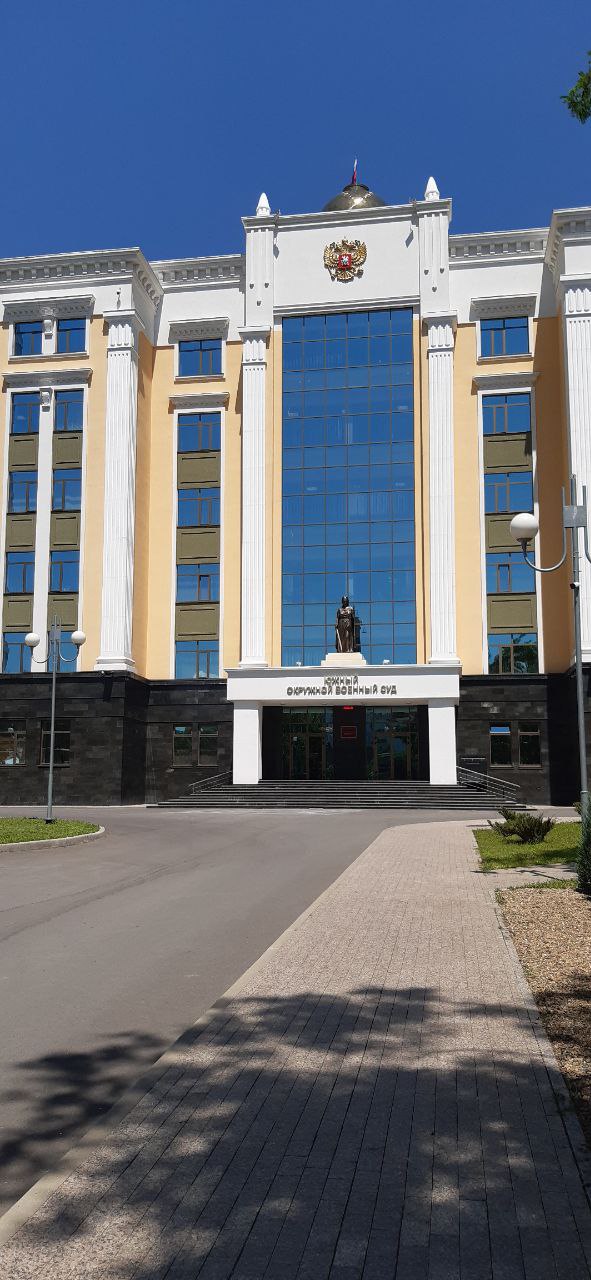

About the case: Anton Vladimirovich Cherednik, a serviceman of the AFU, is accused under Article 278 of the Criminal Code of “violent seizure of power”, part 1 of Article 356 of the Criminal Code of “cruel treatment of civilians, use of prohibited means and methods in an armed conflict”, part 2 of Article 105 of the Criminal Code of “murder” and Article 205.3 of the Criminal Code of the Russian Federation of “training for terrorist activitiesy”. According to the investigative committee, Cherednik shot a civilian for mispronouncing a phrase in Ukrainian.
The case is being heard by a panel consisting of: presiding judge Vyacheslav Alexeyevich Korsakov, Ilya Nikolaevich Bezgub, and Mukhamed Khasanbievich Kilyarovthe of Southern District Military Court.
During the hearing, a person who was on trial in another case was questioned [the judge specifically clarified this with the prosecutor, that this was not a witness in the “usual sense”] – a citizen of Ukraine Anton Alexandrovich Baitrakov: Baitrakov, together with Cherednik, was patrolling a street in the village of Mirny on the evening when Cherednik shot a civilian. The interrogation was conducted via videoconference from the Rostov-on-Don pre-trial detention center, where Baitrakov was transferred from the Lugansk People’s Republic.
The presiding judge explained to Baitrakov the right not to testify against himself and his relatives under Article 51 of the Constitution, the right to a lawyer and to a defense, and that he had “the right to testify or not to testify”. The prosecutor was the first to ask questions, although Baitrakov had asked to be questioned in court by his lawyer. At first, Baitrakov said twice in response to the prosecutor’s question that “everything is written in the file”. The judge explained to Baitrakov the principle of directness, in connection with which he asked: “Don’t just repeat that everything is in the file.” The prosecutor asked if Baitrakov remembered the circumstances of that evening, Baitrakov answered vaguely, and the prosecutor asked no more.
The court invited the lawyer to ask questions. Baitrakov did not hear the first question, the secretary asked the lawyer to come closer to the microphone. Baitrakov answered the lawyer’s questions with one syllable, sometimes with “I don’t remember”. Cherednik also wanted to ask questions, but since he was doing it from the “aquarium,” Baitrakov could not hear him. The court asked the lawyer to repeat Cherednik’s questions. The lawyer did not repeat the questions word for word, but rephrased them.
Korsakov asked Cherednik what he was trying to accomplish with these questions. Cherednik replied that the materials showed that he allegedly had a chevron with a badger on his arm, which was not true. Finally, Baitrakov said that he could not remember whether there was a badger on the chevron.
The prosecutor then asked questions again. Baitrakov answered “I don’t remember” several times. At the end of the interrogation, the prosecutor filed a motion to disclose Baitrakov’s earlier testimony because there were contradictions in the testimony given in that session. Defense counsel did not object. The court granted the request. The prosecutor read the testimony, followed by a brief dialogue:
– Did you hear that? – The prosecutor asked
– I did.
– Are you confirming?
– I do.
– Did you understand the meaning of your statement at that time?
– Baitrakov: Yes.
The court asked whether Baitrakov had consumed alcohol that day – he replied that he had not. The defense attorney and Cherednyk had no questions after the reading. The videoconference was stopped by order of the presiding judge. The court also said that “the time for today’s proceedings is over”. The court asked the parties what they wanted to do next. The prosecutor asked to review documents from the case file. The lawyer said that there were no more witnesses from his side, adding that the pre-trial detention center had not responded to the request for a medical examination in connection with Cherednyk’s health complaints [and said by phone that it would not do so]. The presiding judge clarified the purpose of the examination. Counsel:
– To provide assistance.
The court advised to appeal the refusal of the pre-trial detention center in the administrative order. At the same time, the court added that if there was something about the health condition, it would be possible to discuss it during the questioning.
The court adjourned.
© 2019-2021 Independent public portal on impartial trial monitoring
